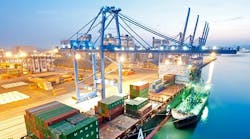The retreat from free trade in 2017 following the UK’s Brexit vote and the collapse of global and regional trade talks are concerns to the logistic sector. Nearly 69% of logistics professionals say they worry according to the 2017 Agility Emerging Markets Logistics Index,
A significant minority – 43% -- said the International Monetary Fund’s 2017 emerging markets growth forecast of 4.6% is too optimistic.
Essa Al-Saleh, CEO of Agility Global Integrated Logistics, said logistics providers and their customers are concerned that anti-globalization feeling and populist policies in the UK and United States could spread and harm trade in emerging markets that rely heavily on exports.
“Emerging markets continue to deliver the highest growth rates in the world, but as links in the global supply chain, countries can be extremely hard to evaluate,” Al-Saleh said.
Logistics professionals picked India as the emerging market with the most logistics potential and the country where their companies are most likely to invest. India climbed past United Arab Emirates to No. 2 in the Index after China.
“Uncertainty and volatility have characterized many emerging markets in 2016,” said John Manners-Bell, CEO of Ti, whose firm compiled the index.
“This has been compounded by the political environment in Europe and the U.S., which will have direct consequences on trade with Latin America, Asia and Africa. However there have been many positives too -- for example, the strong performance of India,” Manners-Bell added.
2017 Index highlights:
• Twenty-four of the 50 countries – including seven of the top 10 -- experienced a year-over-year deterioration in their Index scores, reflecting stagnation in global trade growth and turbulence in emerging markets.
• China, the world’s second-largest economy, remains the world’s leading emerging market. In the survey, supply chain executives identified the direction of China’s economy as the factor most likely to drive global economic and trade growth in 2017. Seventy-six percent said China’s slowing economy is slowing, but only 17% said the slowdown is significantly hurting the transport and logistics sector. Sixty-six percent said lower growth will not alter their plans in China.
• Robust growth and long-anticipated tax and economic reform pushed India to No. 2 in the Index and impressed the logistics executives surveyed. Even so, India’s surprise decision to remove high-denomination bank notes from circulation and encourage cashless payments could be jarring for the economy in 2017.
• UAE, No. 3 overall in the Index, again topped the rankings in the areas of business climate, and in logistics infrastructure and transport connections. Gulf countries UAE, Qatar, Oman, Bahrain, Saudi Arabia and Kuwait claimed six of the top 10 spots for best business conditions.
• Iran climbed eight spots in the Index rankings to 18th overall and leaped to 9th from No. 15 among emerging markets countries that executives view as having the most potential to grow as logistics markets. Iran’s gains were the biggest of any country in the Index or the survey.
• Africa’s biggest economies – Nigeria and South Africa – were among the countries that fell most sharply in the Index. Smaller African markets – Uganda, Ethiopia, Tanzania and Kenya – improved their rankings in 2017.
• Brazil held its No. 7 Index ranking despite a painful recession and the impeachment of President Dilma Rousseff. In the survey, logistics executives again picked Brazil as the the market with the most logistics potential after India and China. One reason for their optimism: nearly 57% expect commodity prices to rebound in 2017, although most do not expect significant increases.
• Bahrain jumped five spots in the latest Index to No. 23 after years of social unrest that hurt its ranking. Argentina, attempting to end years of international economic isolation, climbed three places to No. 28. Kazakhstan shot up four spots to No. 14, largely on the strength of business conditions that ranked behind only those of four Gulf countries – UAE, Qatar, Oman and Bahrain.
• Turkey weathered the effects of an attempted coup and extremist violence, moving from 10th to No. 9 in the latest Index. Russia fell from 9th to No. 10, a modest slip suggesting that has contained the fallout from Western economic sanctions and low energy prices.



